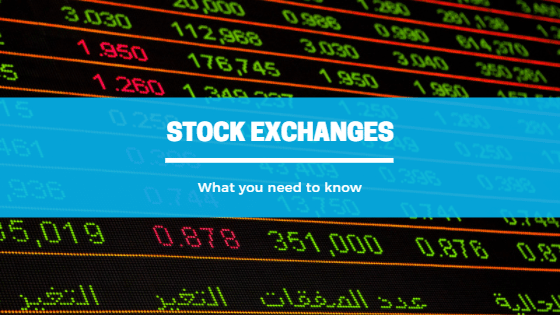The stock exchange, also known as the stock market or bourse, represents a place for selling and buying securities like shares, stocks, bonds, and other financial instruments. As a ready market for securities, the stock exchange has two main functions such as ensuring its liquidity and encouraging people to channel savings into corporate investment.
As a pricing system, the stock exchange allocates capital among companies by determining current prices, which reflect the actual investment value of a specific company’s stock.
Typically, these prices represent the actual current value of the stream of expected income per share. In today’s article, I will discuss stock exchanges, so let’s begin!
What’s Stock Exchange?
Stock exchanges aren’t physical spaces but virtual ones, still they’re highly regulated and dominated by electronic trading. Some of the stock exchanges in the USA include the NASDAQ (National Association of Securities Dealers Automated Quotations) and the New York Stock Exchange (NYSE).
NYSE asks firms to keep a share cost of at least $4. The NASDAQ, on the other hand, is the first choice of companies that want to sell shares to the public market for the first time with an IPO. Moreover, it’s the first electronic exchange that allows investors to buy and sell stock online without a trading floor.
If stocks don’t trade on listed stock exchanges, they can trade in the OTC (over-the-counter) market. This market isn’t as formal. Or regulated. And these OTC-traded shares include smaller and riskier companies such as penny stocks that don’t match the listing demands for standard stock exchanges.
How Does The Stock Exchange Work?
When stockholders want to sell their shares in the future, they visit established stock exchanges looking for buyers. Without stock exchanges, they would have to look for buyers by contacting friends, family, or community members.
The stock exchanges make finding buyers easy in what’s also known as the “secondary” market. You will probably never meet the person on the other side of your exchange with stock exchanges. It could easily be a retired teacher on the other side of the world, insurance groups, etc.
The trades operate like auctions. And traders who think that a business will do well will bid the price up. Those who think that it won’t do well will bid it down. The buyers want to pay the lowest price possible, so they can sell for a profit later, while sellers want to earn more money.
Functions Of A Stock Market
Stock markets have multiple functions, such as the following ones I will discuss below!
Fair dealing in securities transactions
The stock market must ensure that all market parties have fast access to information for all buy and sell orders, depending on the regular terms of supply and demand.
So, they help in the transparent and equal pricing of securities. They also should do efficient matching of relevant buy and sell orders.
For instance, there could be three potential buyers who have submitted orders for purchasing Microsoft shares at $100, $105, and $110. And there could be four sellers winning to offer Microsoft shares at $110, $112, $115, and $120.
The stock exchange, through automated trading systems, must ensure the matching of best buy and best sell, which in this case is at $110 for the provided quantity of trade.
Efficient price delivery
Stock exchanges should support a very efficient system for price discovery, which stands for the process of determining the right price of securities. It’s often done by assessing market supply and demand and other subjects associated with the transactions.
For instance, a US-based computer company has a market capitalization of $5 billion. And it’s trading for $100. A news article comes in that the EU regulator has added a $2 billion fine on the firm, which means 40 percent of the company’s value can be wiped out.
While the exchange may have applied a trading price range of $90-$110 on the company’s share price, it should efficiently alter the legal trading limit to meet the possible changes in the share price. Otherwise, shareholders can struggle to trade at a fair price.
Liquidity maintenance
Collecting the number of sellers and buyers for specific financial securities isn’t possible for markets. Still, they must ensure that whoever’s qualified and open to trade obtains quick access to submit orders that should get completed at fair prices.
Security and validity of transactions
A more significant number of participants ensures a more efficient work of stock markets. Still, stock markets must ensure that all market participants meet the rules and regulations, leaving no space for default by any parties. They also should be verified and follow the regulator’s rules.
Support all eligible market participants
Marketplaces consist of various participants like market makers, speculators, traders, investors, hedgers, and so on. And all of these market participants have different roles in the stock market.
For example, investors can purchase and keep stocks for an extended period, while traders can enter and exit positions within seconds. Market makers, on the other hand, provide necessary liquidity.
Hedgers prefer trading in derivatives to mitigate the risk included in investments. So, exchanges must ensure that all of these parties can work properly, so the market can also work correctly.
Investor protection
Not only institutional and wealthy investors take part in the stock market. Smaller investors with a lack of financial knowledge participate as well. And the market must implement measures to prevent smaller investors from making the wrong decisions when investing in stocks and other products.
So, exchanges should protect every investor as well as reduce financial loss and build trust. For example, a stock exchange can sort stocks in different segments depending on their risk profiles, as well as enable restricted or no trading by everyday investors in high-risk stocks to prevent financial loss.
Balanced regulation
The stock market heavily regulates the listed companies. Also, market regulators monitor their dealings. Furthermore, stock exchanges place specific requirements.
For instance, they require the filing of quarterly financial reports promptly and instant reporting of any crucial developments to ensure all market parties know about corporate changes.
Finally, if someone fails to complete the regulations, they will have to deal with a suspension of trading by the stock markets and other disciplinary measures.
Regulating the stock market
A proper monetary authority or institute or local financial regulator has the task of regulating the stock market of a country. For instance, the Securities and Exchanges Commission regulates the stock markets in the US. It’s a federal agency that operates independently of political pressure and government.
Key Players At A Stock Exchange
The stock exchanges aren’t simple! On the contrary, they’re complex and consist of many players. In this section, I will discuss some of the most significant market participants, so let’s take a closer look.
Brokers
Brokers represent companies or people that stand for the interests of outside investors at markets. Also, because only members of stock exchanges can purchase and sell assets on them, brokers work as agents who locate buyers and sellers to compete for outside investors, such as yourself.
These market participants usually charge fees or commissions for their service. Some brokers even work for the stock exchange and help keep things moving in the right direction.
Dealers
The dealers purchase and sell securities for themselves. They can either be individuals or companies, and they always try to make some money from the difference between the prices.
In other words, they aim to purchase stocks at specific prices not so they can hold onto them for a more extended period but because they try to turn them around and sell them for a higher price.
In this manner, although brokers don’t represent outside investors on the stock exchanges, they can end up helping by making trades easier with them indirectly in their pursuit of profit.
Broker-dealers
You can also find different market participants who come together like brokers and dealers, also known as broker-dealers. They combine into one company and purchase and sell stocks on behalf of investors on the outside. They can also trade for their benefit.
Marker makers
The market marker role is played by dealers who purchase and sell stocks for profit and boost the overall liquidity of stock exchanges. The latter helps facilitate better trading and makes orderly markets.
The NYSE, for instance, has a category of market makers, also known as specialists, who only trade in one or multiple individual stocks.
Different Types of Stock Exchanges
The trading that takes place on stock exchanges comes in different forms. So let’s learn more about the different types of stock exchanges.
Auction markets
The name of these markets is self-explanatory.
So basically, the price of securities in these markets is set by the highest bidders. And that’s called a bid. It’s also determined by the lowest price the seller is open to accepting, called an offer.
In these markets, broker-dealers submit bids and offers. Then, they execute trades on the behalf of their clients. Or themselves, if they’re acting as dealers.
Dealer markets
In dealer markets, dealers announce the prices they’re willing to purchase or sell particular stocks. Then, they facilitate all transactions by using their money to purchase and sell the securities. This boosts the liquidity of the stock market.
In other words, in dealer markets, dealers can purchase stock from you at a specific price, sometimes without having buyers in mind to sell your stock to.
And since you don’t have to wait for buyers to pay you, you’re free to purchase other securities from the dealer. Or utilize that money in other ways.
Electronic exchanges
Electronic exchanges utilize technology to connect buyers and sellers in a virtual marketplace instead of requiring brokers to sell on trading floors.
Today, every stock exchange provides electronic trading, and few exchanges still have in-person trading floors. The ECNs (electronic communication networks) enable the purchase and sell orders for stocks and other securities to be executed without market makers.
In the USA, all electronic communication networks should be registered with FINRA (Financial Industry Regulatory Authority) as broker-dealers.
OTC exchanges
OTC (over-the-counter) exchanges allow the purchase and sale of securities outside of stock exchanges, typically via broker-dealer networks.
Usually, stocks traded over the counter are small businesses that don’t meet the requirements of stock exchanges, like penny stocks.
Purpose of Stock Exchanges
The stock exchanges operate as agents for the economy by enabling trades and spreading information. Let’s learn more about the three primary purposes of stock exchanges.
Raising capital
Via IPO (initial public offerings) or releasing new shares, companies can raise capital to fund expansion projects and operations. So this gives companies avenues for boosting growth.
Corporate governance
Businesses that list themselves publicly on stock exchanges should meet the reporting standards that regulating bodies apply.
This includes having to publicly and regularly report their earnings and financial statements to their shareholders. The actions of the companies’ management affect their value because they’re constantly under public observation.
Public reporting helps ensure that management will execute decisions and actions that benefit the goals of the companies and their shareholders, thus acting efficiently.
Economic efficiency
Not only boosting management efficiency, but exchanges also help economic efficiency via the issuing of capital. They provide avenues for people to invest their money instead of saving them.
The capital people would otherwise save is used towards economic benefits, resulting in a better economy. Also, stock exchanges provide liquidity because it’s easy to sell one’s holdings.
And by offering real-time price data and liquidity on companies' shares, stock exchanges boost a better market as well by enabling investors to determine the value of business via supply and demand actively.
Best Stock Exchanges
There’s a wide selection of stock exchanges around the world. Below, I will review a few of the many major stock exchanges worldwide, so take a look. We also have a list of stock exchanges here.
New York Stock Exchange
The NYSE is one of the biggest stock exchanges in the world where some of the most popular companies, such as Amazon, Apple, and much more, trade.
The New York Stock Exchange is an auction market where most trading happens virtually. Still, the stock exchange also has a physical trading floor.
NASDAQ
The NASDAQ is another well-known stock exchange. It’s a dealer-market stock exchange that pioneered electronic trading. The company was established in the 1970s and makes a great place for big tech firms who want to trade. It’s their first choice because of the lower obstacle to public trading.
London Stock Exchange
One of the largest stock exchanges in Europe is the LSE, where thousands of well-known companies from all around the world trade. The stock exchange also has a physical trading floor in London.
Shanghai Stock Exchange
If you’re looking for stock exchanges in China, look no further than the Shanghai stock exchange. It’s one of the biggest stock exchanges that trade two types of stocks, including A-shares and B-shares.
The B-shares are quoted in US dollars, so they’re available for foreign investment, and foreign investors can only invest in these shares if they meet specific criteria. A-shares, on the other hand, aren’t available for foreign investors, and they’re quoted in Yann.
How To Buy Stocks On Stock Exchanges?
You can open a brokerage account online and start purchasing and selling securities listed on popular stock exchanges.
If you’re looking for step-by-step guidance and personalized advice, you can choose a financial advisor as your broker. You can also contact a full-service brokerage company. Make sure you read our guide on buying stocks.
No matter what you pick, your broker will send buy and sell orders to broker-dealers who trade on stock exchanges. They always try to find buyers or sellers who can pay the price specified in your order. The execution of your order can take more or less time, depending on the market's liquidity.
If you’re unsure what stock exchanges to choose and what stocks to invest in, consider doing it with a Robo-advisor.
These advisors utilize your risk tolerance and financial goals to create a strategy for you and automate the investment process. So, consider this option if you’re a beginner.
Competition Of Stock Markets
Naturally, there’s competition between individual stock exchanges because they all chase the maximum transaction volume. But stock exchanges as a whole have other competitors such as the following.
Dark pools
Dark pools or private exchanges for securities trading not accessible by the investing public.
Contrary to popular belief, dark pools are hevily regulated by regulatory bodies.
Blockchain ventures
With the booming popularity of blockchains, many crypto exchanges have also surfaced.
Such exchanges provide places for cryptocurrencies and derivatives associated with those assets.
They all threaten regular stock markets because they make the whole process digital and offer low-cost or zero-cost services. This makes crypto exchanges more appealing than traditional ones.
Conclusion
Stock markets play a crucial role in the free-market economy. They enable companies to produce capital by offering corporate bonds and stock shares.
They enable investors to take part in the financial goals of the businesses, make money via capital gains, and earn money via dividends, which comes with a risk.
Professional money managers and institutional investors have some privileges because of their wealth, high risk-taking ability, and better knowledge. But stock exchanges try to provide a level ground to most individuals.
Overall, stock markets work as platforms via which investments and savings of individuals turn into new investment opportunities. And in the long run, this helps in economic growth and capital formation for the country.




